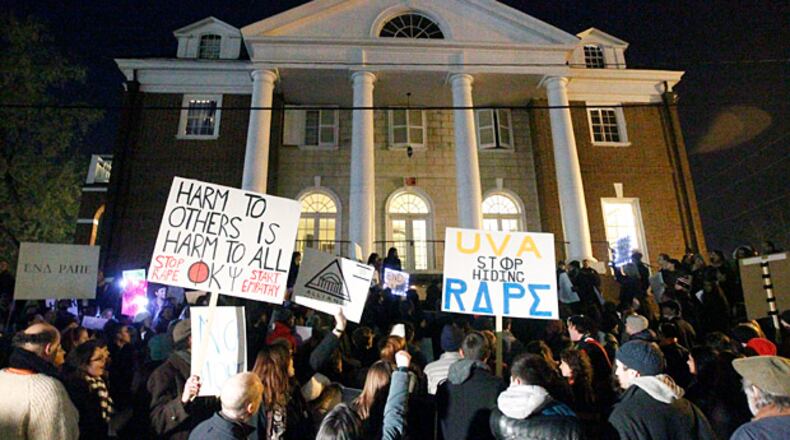A female student at the University of Virginia, in an exhaustively detailed account to a Rolling Stone reporter, described how seven men gang raped her at the Phi Kappa Psi fraternity house in 2012 while her date, a frat brother, watched. The victim said the assault appeared to be part of an initiation.
Upon its November publication, that piece, subtitled "A Brutal Assault and Struggle for Justice at UVA," sent shockwaves through several interlocking communities: those on campus, UVA graduates, sexual assault advocates and student rights advocates, to name a few.
The day after publication, Phi Kappa Psi announced it had surrendered its fraternal agreement with UVA. The university soon announced it had suspended all fraternities until January. UVA President Teresa A. Sullivan told students she had "asked the Charlottesville police to investigate the incident."
"It makes my heart race with anger even thinking about that sort of dehumanizing selfishness," UVA alum and former Entertainment Weekly writer Grady Smith wrote. "I think we all agree that justice must be served, even if we aren't sure of exactly what that looks like."
A follow-up article in the magazine included more allegations of sexual assault at the school.
But Rolling Stone, and reporter Sabrina Rubin Erdely, this week faced a round of criticism over Erdely's reporting process and that she didn't make contact with or name the alleged attackers in her original piece.
"Why didn't a Rolling Stone writer talk to the alleged perpetrators of a gang rape at the University of Virginia?" asked Allison Benedikt and Hanna Rosin, for Slate. (Erdely earlier told them, "I reached out to [the accused] in multiple ways." She eventually spoke with the chapter's president and a spokesman from the national office.)
Unnamed sources told the New York Times that the victim "requested that her assailants not be contacted, and Rolling Stone decided that her situation was too delicate to risk going against her wishes."
In his Tuesday blog, Washington Post media critic Eric Wemple was skeptical: "The charge in this piece ... is gang rape, and so requires every possible step to reach out and interview them, including e-mails, phone calls, certified letters, FedEx letters, UPS letters and, if all of that fails, a knock on the door. No effort short of all that qualifies as journalism."
Wemple described Erdely's reporting -- including her decision not to name the alleged rapists or the three friends the victim spoke with immediately after the assault -- as "flimsy" and "half-hearted."
Some, such as Richard Bradley, have even wondered if the gang rape itself was a hoax. Jonah Goldberg, writing in the Los Angeles Times, scrutinized, among other details, the victim's rememberance of two assailants' nicknames.
Erdely told the Post that she was unable to make contact with the accused, but Rolling Stone editor Sean Woods said: "I'm satisfied that these guys exist and are real. We knew who they were." Erdely reiterated to the Post that she found the victim's story credible.
"By dwelling on this, you're getting sidetracked," she said, adding that her reporting focuses on how UVA failed to properly respond to the allegation at all. Others, including at the New Republic, have agreed with this interpretation of the piece.
This week Rolling Stone released the following statement, "Through our extensive reporting and fact-checking, we found [the victim] to be entirely credible and courageous and we are proud to have given her disturbing story the attention it deserves."
More news of the day:
About the Author
The Latest
Featured


